He only lived five more months
The following excerpt is from a letter which has been transcribed from The Alabama Historical Quarterly, Vol. 19, Nos. 03 & 04, Fall and Winter Issue 1957. It was originally written in 1847 by John Dandridge Bibb, brother of Alabama’s first two governors, William Wyatt Bibb and Thomas Bibb. He wrote the letter to Col Albert J. Pickett, Esq., Alabama’s first historian to provide details about the people and events that took place when Alabama was first organized as a Territory, and as a State in 1819. John Dandridge Bibb died only a few months later after writing this letter on May 9, 1848.
John Dandridge Bibb (1787-1848)
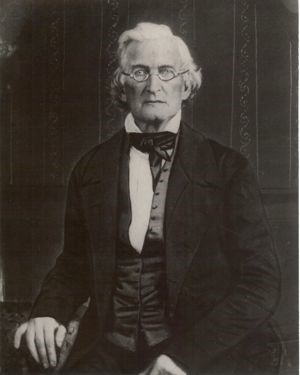
John Dandridge Bibb wrote the letter to Col Albert J. Pickett, Esq., Alabama’s first historian to provide details about his brother and the people/events that took place when Alabama was first organized as a Territory, then a State in 1819. John Dandridge Bibb died only a five months after writing this letter on May 9, 1848, at his home on the Yazoo River in Carroll County, Mississippi. Click on their names here to read more about John Dandridge Bibb and Col. Albert J. Pickett.
Col. Albert J. Pickett – Alabama’s First Historian
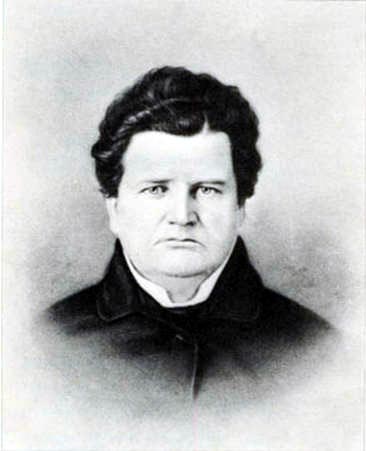
GOVERNOR BIBB AND THE TIMES
Notes by John Dandridge Bibb as told to Col. A. J. Pickett Swan Lake, Carrol Co. Missi. 1st Dec. 1847 Albert J. Pickett Esq.
Dear Sir
Agreeably to your request some two or three months, past, I have committed to paper a bundle of crude sketches of Alabama in its infancy. I have done so entirely from memory, having no document at hand to assist me In thus attempting to record facts, many of them occuring (sic) thirty years ago, it is reasonable, there are some mistakes. What I have said is to the best of my recollection.
I send you the first draft, noted down from time to time as I found leisure. In reading them over, I discover many grammatical blunders, bad spelling, with many inaccuracies which I might have corrected by transcribing, but believing you will fully understand what I mean, I deemed it unnecessary labour. Wheather (sic) perfect or otherwise they are yours, either to burn or use as you may think best If they shall be of any service in aiding you in your praiseworthy undertaking, I shall be grateful and my end accomplished. If otherwise, the labour has been but trifling. Since my return home I have seen and conversed with Col. Greenwood Laflore a native Chacktaw (Choctaw?) who has promised to furnish me with traditionary (sic) sketches of his own tribe and also of the Chickasaw nation. When I obtain them, I will forward them to you. You are at liberty to permit my brother William’s widow and my brother Benajah to peruse my scrawl as they may correct errors.
With consideration of high respect and regard,
I am yours sincerely, John D Bibb
First. In relation to the late Governor Bibb.
Gov. William Wyatt Bibb, Alabama’s First Governor
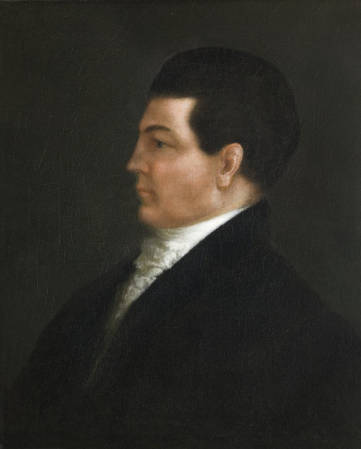
Birth and early life
William Wyatt Bibb was born in Amelia County State of Virginia October 2nd A.D. 1781. He was the eldest son of Captain William Bibb a native of that State who was a man of plain practical sense with what men termed a good education for the time that he grew up. He held the commission of a Captain in the revolutionary war and was subsequently a member of the Legislature of his native state.
William Wyatt s mother’s maiden name was Sally S. Wyatt, born in New Kent County same state. She was a woman of superior intellect which had been cullivated (sic) by a fine education. She possessed great energy of character, all the traits of a most devoted mother and a heart teaming with the milk of human kindness.
Captain Bibb imigrated (sic) to the state of Georgia when it was a wild frontier country and settled with his family on the Savannah River in Elbert County. He died in 1796 leaving his widow with eight children and the ninth born a few months after his death, (Benajah) – Wm W. then being in his 14th year. The pecuniary condition of the estate was incumbered (sic) with debts, but by the judicious management of the widow, who was left sole executrix a scant sufficiency was saved from the wreck of an once comfortable fortune to give the children an Academic education.
The subject of these notes previous to the death of his father had but little opportunity to advance in learning owing to the unsettled and frontier condition of the country. His mother soon afterwards sent him to an Academy at Washington Wilkes County under the superintendance (sic) of the then celebrated Hope Hull, whose fame as a Methodist preacher and “a son of thunder” was extensively known. Here he continued until he acquired such a knowledge of the branches taught at such institutions as to qualify him to enter college. He was sent to William & Mary in his native state where he remained about two years and then returned home.
First studied medicine, then law
At the beginning (sic) of his 18th year, he commenced the study of medicine in the City of Augusta under Doctor Murray, a gentleman of high character in his profession. He attended two courses of Lectures in Philadelphia and in due time graduated as M.D.
At the age of 21, he commenced the practice of his profession in the then flourishing Town of Petersburg, Ga. His devotion to study had much impaired a naturally feeble constitution, so that after a few years of laborious practice he gave up his profession and turned his attention to politics, About the time he commenced practice, he married Miss Mary Freeman only daughter of Colo. Holman Freeman of revolutionary memory, of Wilkes County. She was one of the most beautiful and accomplished ladies in her native state and made him a most affectionate and devoted wife. She bore him four children. Two, only survived him, a son and daughter. The other two (twins) died in their infancy.
Mary (Freeman) Bibb (wife of William Wyatt Bibb First Governor)

Became a Representative
He was elected a member of the House of Representatives from Elbert County a day or two after he was constitutionally elligible (sic). He served as a member four years with that devotion to his duties, for which he was, through life, peculiarly remarkable. During this period he acquired a share of popularity that is rarely gained by men at his early age. There was nothing during his sojourn in the Legislature of Ga calculated to call forth any extraordinary efforts. He, however, made several speeches that did him some credit.
At the age of 25 years when barely elligible (sic) he was called out by the people of Georgia to represent them in the Congress of the U. S. He obeyed the call and was honorably elected. The system of voting in Georgia was by general ticket and not by district. He took his seat in Congress the first time at the session of 1806 (I think) During his service in the representative department of the Nation he was an active and efficient member. (I was too young at that period to attempt to record from memmory (sic) the measures and subjects in which he took a conspicuous part. For correct information I refer you to the history of the times and to such private documents as you may be Me to procure from his widow).
Appointed Governor of Alabama Territory
His cotempories (sic) at his first election were Bolling Hall, George M. Troop and Howel Cobb. I do not distinctly recollect in what year he entered the senate of the U. S. His career in Congress terminated in the year 1816. when he rec’d the appointment of Governor of Alabama Territory from President Monroe. At the commencement, and indeed throughout his congressional career he was identified with the Republican party. In the state of Georgia, there was scarcely any political distinction known. The state was republican throughout with a few individual exceptions, William H Crawford at the commencement of Doctor Bibb’s political life, had already taken a conspicuous stand as a public man and then gradually grew up in the state a division known as the Clark and Crawford parties. These parties grew out of a spirit of rivalship between those two men, which at first was more of a personal than general character. In the course of time however, others took sides until the whole state became more and more affected either on the one side or the other. There were, however, many exceptions of men who kept aloof from the contention. This sort of party spirits, at last, grew to such a point that a Clark man could scarcely be induced to vote for a Crawford man and also the reverse. Doctor Bibb took rank with the Crawford party. Still in all this strife. Georgia was Republican whichever party prevailed.
A citizen of Georgia while Governor of Alabama Territory
His appointment as Governor ensued on the division of Mississippi into two Territories, Miss-and Alabama. Both Territories were acquired under the provisions of the Ordinance for the Government of the North Western Territory (which you will find in the old Mississippi Digest). The Governor of Ala’ba was vested with the whole power of organizing the Territory by the appointment of all Officers, civil and military. This responsible trust was performed by Governor Bibb with fidelity and judiciousness. When he rec’d the appointment of Governor, he was a citizen of Georgia. In the summer of 1817 he visited Alabama for the first time and purchased a home on the Coosa & Alabama Rivers.
Here he removed his family in the winter of 1817 where they resided in a comfortable log cabin until his death. It was not required that the Governor should reside at the seat of government, he being invested with the power of appointing a Secretary of the Territory who resided there in the absence of the Governor and on such occasions, his powers & duties were commensurate with his. Henry Hitchcock, a gentleman of a high order of talent of sterling integrity and industry, was appointed by the Governor to fill this important office, the duties of which, he discharged with fidelity and credit. The seat of the Territorial Government was located at the Town of St. Stephens (the history of which you would do well to examine) on the Tombeckbe River. (Tombigbee River). At the first session of the Legislature the duty of appointing one .Delegate to Congress devolved on them. John Crowel was elected. The priviledges (sic) of a Territorial deligate (sic) in Congress were limited by withholding the rights to vote. In every other respect his priviledges (sic) were those of state Representatives. He had the right to present petitions to discuss all questions before Congress, to receive equal pay &c. John Crowel was not talented, but the Territory at that time had no one else to spare that would have done any better.
Dangerous situations on trips to Alabama
The Governor usually made two or three trips to the seat of government during the recess of the Legislature in order to consult with his Secretary and to make the necessary arrangements to meet emergencies.
During this time a second Indian War had commenced and was raging with great annoyance and sometimes loss of life to the frontier settlers. This was carried on by such parties of the Creeks as were dissatified (sic) with General Jackson’s Treaty and were making their way South to join the Semminoles (sic) in Florida.
On one occasion as the Governor was returning from the seat of Government to his residence with no attendant hut his servant Peter, he having a brace of small pocket pistols and Peter armed with a little double barrel gun, he stoped (sic) at old Fort Dale to eat his snack and graze his horses. Two or three families only resided in the neighborhood of the Fort and one family immediately at the place. The Governor departed on his travels at about one O’clock and in two hours afterwards, the family residing at the Fort were attached by a party of wandering hostile Creeks and cruelly murdered and scalped. The wife, had, a short time previously gone to a neighbor’s house and on returning instead of being greeted by her husband and five children whom she had left a short time before she beheld their bones smouldering (sic) in the ashes of her dwelling. The Governor narrowly escaped their melancholy fate.
At a subsequent period the Governor arrived at the eastern Bank of the Tombeckbe opposite St. Stephens on his way to the seat of government, several travelers were in company. The River was very full and the ferry boat leaky, and frail, he was travelling (sic) in a one horse Dearborn the body of which was water proof. They entered the Boat and when about half the distance across it was found to be in a sinking condition. He could not swim and his situation was perilous, his faithful servant Peter true to his Master speedily loosened the horse from the vehickle (sic) and turned him into the River and requesting his Master to seat himself in the carriage, by his skill in swimming carried him safely to land. The Governor did not forget Peter in his dying hour. Nearly his last words were, addressing himself to one of his brothers, “On account of his fidelity to me, it is my will and earnest desire that my servant Peter have his freedom after the death of his first owner.”
Died when he fell from his horse
At the expiration of the territorial Government, a constitution was formed and Alabama became one of the sister states of the Union Governor Bibb was elected first Governor of the New State and about the expiration of half his term he died on the — of July 1820. His death was occasioned by the falling of his horse which so injured him that after suffering excruciating pain for several months he expired at his residence in Autauga County. Calm collected and peaceful, surrounded by his family and many of his relations and friends he departed in the 40th year of his age. Few men ever lived of more habitual industry and devotion to all the duties, public and private, he was called on to perform. As a husband and father he was most affectionate and kind, as a relative and friend, faithful and sincere and as a public servant, he was true and honest. By his conciliating disposition and suavity of manner he had endeared himself to a large circle of friends. He was credulous to a fault, and many who knew this trait in his character availed themselves of it to act with deception and insincerity towards him. In stature he was 5 feet 10 inches high with a delicate and weakly frame. His weight, when in health not exceeding 125 pounds. His face was strongly marked with signs of deep thought and intelligence, his eyes dark, his annunciation clear and distinct and his language chaste and pure. If he excelled in any one trait, it was in the selection of words and sentences. He was never known in conversation to utter a word that he would have been ashamed to pronounce in the circle of the most refined female. Vulgarity of every character and description exciting in him the most palpable disgust.
Few men ever lived of more habitual industry and devotion to all the duties, public and private, he was called on to perform. As a husband and father he was most affectionate and kind, as a relative and friend, faithful and sincere and as a public servant, he was true and honest. By his conciliating disposition and suavity of manner he had endeared himself to a large circle of friends. He was credulous to a fault, and many who knew this trait in his character availed themselves of it to act with deception and insincerity towards him. In stature he was 5 feet 10 inches high with a delicate and weakly frame. His weight, when in health not exceeding 125 pounds. His face was strongly marked with signs of deep thought and intelligence, his eyes dark, his annunciation clear and distinct and his language chaste and pure. If he excelled in any one trait, it was in the selection of words and sentences. He was never known in conversation to utter a word that he would have been ashamed to pronounce in the circle of the most refined female. Vulgarity of every character and description exciting in him the most palpable disgust.
Chose Cahawba as the seat of Government
During his administration of the Territorial Government his duties were laborious and severe. Many important trusts were confided to him, most of which had necessarily to be performed by men of his selection and appointment for whose faithfulness he ever held himself responsible. Amidst this multiplicity of Territorial offices to be filled and tho many of his relations resided in the Territory, he never but in one instance appointed one of them to office. The exception was made in favour of a brother whom he appointed Territorial judge in Montgomery County. This course was not prompted from the absence of regard for his family connexions, (sic) for he loved them most ardently, but from the sensitiveness of his character. He has been heard to remark that a public officer should be like Caesars wife. He carried out this course during his long service in Congress. He never would recommend, or apply for office for a relation.
In addition to other important duties, an act of congress was passed donating to Alabama a certain quantity of Land for the purpose of a seat of Government. He was called on to select the land and the, site. He chose Cahawba and surrounding lands, believing it more central and eligible than any other place where the public land was unsold, (you know its fate) See page 17. The Congress of the United States also donated to the State seventy two sections of Land for a Seminary of learning which he was required to select out of the unappropriated land in Alabama. He appointed commissioners for this purpose, and the selection was made of the best and most valuable land in the State. A great portion of this land was located in the rich valley of Tennessee River in the Counties of Franklin and Lauderdale. (By adverting to the history sale &c of those Lands, you will find that the State institution was more richly endowed than any College in the United States1)
1His meaning Is not clear, but is set out as he entered it Ed
ALABAMA FOOTPRINTS Pioneers: A Collection of Lost & Forgotten Stories
They felt the lure of the frontier and struck out for unknown territory that would become Alabama, bringing with them only very few implements to survive. From Tennessee, North Carolina, South Carolina, Georgia and many other states they came to settle in the newly opened Mississippi Territory. Alabama Footprints Pioneers continues the series with lost and forgotten stories of the earliest Alabama pioneers.
ALABAMA FOOTPRINTS Pioneers includes the following stories
- The Yazoo land fraud
- Daily life as an Alabama pioneer
- The capture and arrest of Vice-president Aaron Burr
- The early life of William Barrett Travis, hero of the Alamo
- Description of Native Americans of early Alabama including the visit by Tecumseh
- Treaties and building the first roads in Alabama.


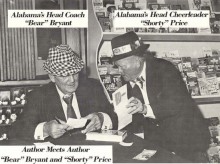

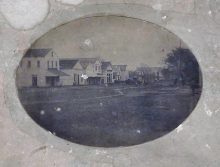
Sadly I have had to unlike your page. Everytime I try a link to read the stories you post I get nothing but a link trying to say I won money. Unsure why, but this has been since I have liked your page. Cant risk something happening. Enjoyed you page immensely.
Norma Snodgrass, me too! So many posts I would like to read, every time, it’s a bad link. I no longer click on them.
Norma Snodgrass I’m having the same problem. I’ve about had it with this page. I love Alabama history too. I hate to move on.
Norma Snodgrass they wants you to buy book
She’s right